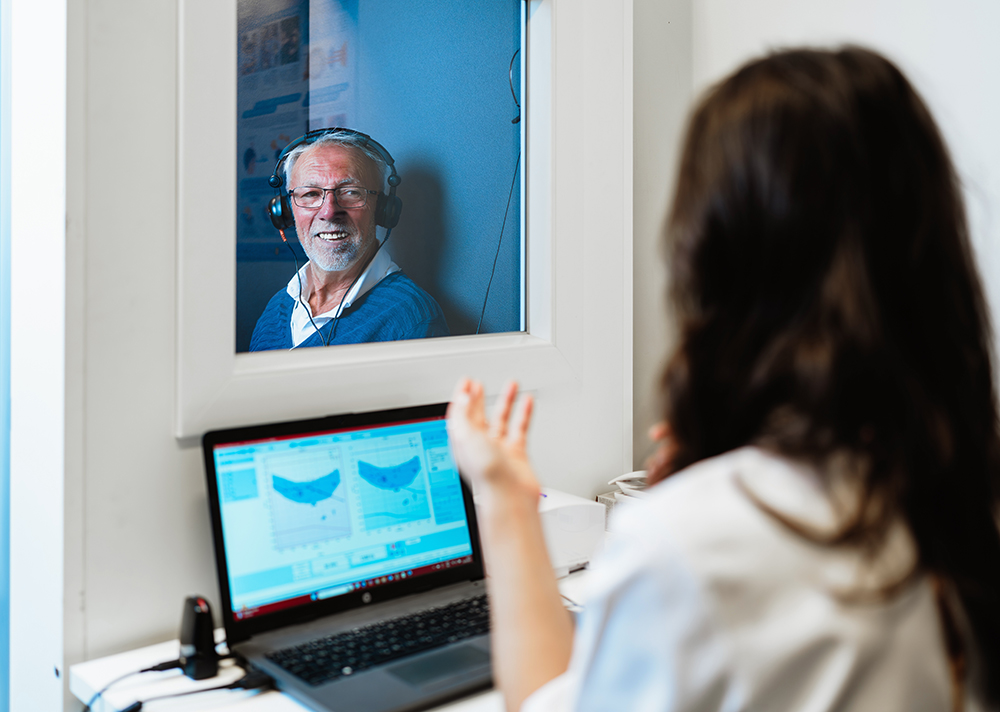The Role of Hearing Tests in Preventative Health Care
Hearing tests are an important part of preventative health care, yet many
New Location Now Open in Fort Mitchell! LEARN MORE →

By: Vanessa Ewert, Au.D, LIC.-A | October 3, 2025
Living with tinnitus means dealing with sounds that only you can hear, whether it’s ringing, buzzing or humming in your ears. About 15% of adults experience tinnitus at some point, and working with an audiologist can make a real difference in how you manage these sounds day to day. Tinnitus can be distracting, interfere with sleep and make it harder to focus, but there are strategies that can lessen its effect on your daily life.
While there’s no single cure for tinnitus, audiologists can offer several approaches to reduce its impact. Sound therapy, hearing aids with masking features and personalized counseling are some of the options that may provide relief. These methods are designed to make the sounds less noticeable and help you feel more in control of your daily routine. An audiologist is qualified on common approaches and can guide you through these options and help you find a plan that matches your needs and lifestyle.
People with tinnitus often describe hearing sounds like high-pitched ringing, low humming, clicking or even whooshing that matches their heartbeat. These phantom noises can be constant or come and go throughout the day, sometimes changing in volume or tone depending on stress levels, background noise or even physical position. The sounds might be in one ear, both ears or seem to come from inside the head itself.
Tinnitus can be linked to a variety of factors, such as prolonged noise exposure, age-related changes in hearing, earwax buildup or certain medications. Stress, fatigue and caffeine are also common triggers that may make the sounds more noticeable. Because these noises are only heard by the individual, they can feel intrusive and may affect concentration, relaxation or sleep, making everyday activities more challenging at times.
While occasional ear ringing after a loud concert usually fades within a day or two, persistent tinnitus that lasts more than a week needs professional attention.
Sudden tinnitus in one ear, sounds that pulse with your heartbeat or ringing accompanied by dizziness or hearing loss require immediate evaluation by your audiologist. These warning signs help you know when to seek help:
If you notice any of these signs, reaching out to an audiologist early can help you find strategies and support to manage tinnitus effectively and protect your hearing.
When you first visit an audiologist about tinnitus, they’ll conduct a thorough evaluation that goes beyond just asking about the sounds you hear. This assessment typically includes hearing tests, medical history review and specific tinnitus measurements that help determine the pitch and loudness of the sounds you’re experiencing.
Many people struggle with describing their tinnitus accurately during appointments, which can make it harder for your audiologist to develop the right treatment approach. A helpful solution is to keep a tinnitus journal for at least a week before your visit, noting when the sounds are loudest, what makes them better or worse and how they affect your daily activities. This information gives your specialist concrete details to work with and helps them identify patterns that might point to specific triggers or underlying causes that need attention.
Hearing loss and tinnitus frequently occur together because damage to the tiny hair cells in your inner ear can cause both problems at the same time.
When these hair cells become damaged from loud noise exposure, aging or other factors, they may send incorrect signals to your brain that create phantom sounds while also reducing your ability to hear actual sounds clearly. The connection between hearing loss and tinnitus explains why many people notice both issues developing around the same time or getting worse together.
Some practical steps can help manage both: using hearing protection in noisy environments prevents further damage, keeping volume levels moderate when using headphones protects remaining hearing and addressing hearing loss with appropriate devices often reduces how noticeable tinnitus becomes since your brain receives more actual sound input to process.
Your first tinnitus evaluation will include several tests that help the specialist understand both your hearing ability and the specific characteristics of the sounds you experience.
Evaluation times can vary, but can last between 60-90 minutes and will typically involve a hearing test in a sound booth, questions about your medical history and medications and specialized tinnitus matching tests where you’ll identify sounds that closely resemble what you hear. Before your appointment, write down all medications and supplements you take, as some can contribute to tinnitus. Bring a list of specific situations where your tinnitus bothers you most, like during meetings or while trying to sleep, so the audiologist can suggest targeted coping strategies.
Audiologists use several specific tests to understand the unique patterns of your tinnitus and how it relates to your overall hearing health. The pure tone audiometry test measures your ability to hear different pitches and volumes, which often shows whether hearing loss exists alongside the tinnitus sounds. During tinnitus pitch matching, you’ll listen to various tones through headphones until you find one that closely matches what you hear internally, giving the specialist valuable information about the frequency of your tinnitus.
These tests matter because they help determine whether hearing devices might reduce how much the tinnitus bothers you throughout the day. When test results show hearing loss in the same frequency range as your tinnitus, using hearing aids often makes the internal sounds less noticeable by providing your brain with more external sound to process. The loudness discomfort level test also checks your sensitivity to sounds, since many people with tinnitus find certain volumes uncomfortable even when others find them perfectly normal.
Some audiologists perform acoustic reflex testing and otoacoustic emissions tests to check how well your middle and inner ear structures work. These tests can identify physical problems that might contribute to tinnitus, such as muscle tension in the middle ear or damage to the hair cells that detect sound. Understanding these test results helps audiologists create treatment plans that target the specific factors contributing to your tinnitus rather than using a one size fits all approach.
Your medical background and everyday routines play a bigger role in tinnitus than many people realize. Past ear infections, head injuries and certain medications like aspirin or antibiotics can trigger or worsen the ringing sounds you hear. Even habits like jaw clenching, poor posture at your desk or drinking several cups of coffee daily might affect how loud or frequent your tinnitus becomes.
Audiologists need this information to spot patterns between your health history and when tinnitus started or got worse. Blood pressure problems, thyroid issues and vitamin deficiencies sometimes contribute to tinnitus, which is why audiologists often ask about your overall health during evaluations.
Have you ever wondered why some days your tinnitus seems louder while other days you barely notice it?
Understanding these patterns and learning effective coping strategies from specialists can help you feel more in control of the sounds you experience. Audiologists provide education about the science behind tinnitus, explaining how your brain processes these phantom sounds and why certain factors make them more noticeable. They teach practical techniques like progressive muscle relaxation and attention shifting exercises that help reduce the stress tinnitus often causes.
Support from your audiologist extends beyond appointments through tinnitus support groups and follow up care that tracks your progress over time. Many clinics offer sessions where you can learn new management techniques and connect with others who understand what living with tinnitus feels like.
Sound therapy works by giving your brain external sounds to focus on instead of the internal ringing or buzzing. White noise machines produce steady background sounds that help mask tinnitus, while nature sounds like rainfall or ocean waves provide a more pleasant listening experience that many people find relaxing.
Notched sound therapy removes the specific frequency of your tinnitus from music or background noise, which may help train your brain to ignore those particular sounds over time.
If constant background noise feels overwhelming, consider trying intermittent sound therapy where you alternate between periods of masking sounds and quiet time to help your brain gradually adjust to the tinnitus.
Many hearing aids now include built in tinnitus masking features that play soft background sounds directly into your ear while also amplifying the sounds around you. These devices help in two ways: they make it easier to hear conversations and environmental sounds while simultaneously providing relief from the internal ringing or buzzing. The combination of improved hearing and masking sounds often makes tinnitus much less noticeable throughout the day.
Studies show that about 60% of people with both hearing loss and tinnitus experience some relief when using hearing aids, even models without special tinnitus features. Modern hearing aids can be programmed with different sound options for various situations, like calming ocean waves for bedtime or white noise for work environments. Your audiologist can adjust these settings based on when your tinnitus bothers you most, creating personalized sound profiles that change automatically as you move through your daily activities.
Living with constant ringing or buzzing sounds can feel overwhelming, and many people find that their tinnitus gets worse during stressful times. Everyday pressures, lack of sleep, caffeine and extended screen time can all make the sounds more noticeable.
Deep breathing exercises practiced for just five minutes each morning can help lower your overall stress levels, while gentle activities like walking, stretching or yoga help release muscle tension that often amplifies tinnitus. Taking short breaks throughout the day, listening to calming music or practicing mindfulness can also make a difference in reducing stress and keeping the sounds from feeling as intrusive.
Managing tinnitus becomes easier when you have professional support and guidance. Our team at Bluegrass Hearing Clinic understands how these persistent sounds affect your daily life and has helped countless patients find relief through personalized treatment approaches. Whether you’re dealing with new tinnitus symptoms or have been living with these sounds for years, professional evaluation and support can help you discover which combination of treatments works best for your specific situation.
If you’re ready to explore your options for tinnitus management, contact Bluegrass Hearing Clinic at one of our convenient Kentucky locations. Call (859) 295-5729 to schedule your comprehensive tinnitus evaluation at any of our offices in Bardstown, Danville, Elizabethtown, Fort Mitchell, Lexington, Mount Sterling, Nicholasville, Paris, Richmond or Somerset. Our specialists will work with you to develop a customized treatment plan that addresses your unique needs and helps you regain control over how tinnitus impacts your life.
Tags: hearing care services, tinnitus management tips, tinnitus treatment

Hearing tests are an important part of preventative health care, yet many
By: Vanessa Ewert, Au.D, LIC.-A | November 18, 2025

Living with tinnitus means dealing with sounds that only you can hear,
By: Vanessa Ewert, Au.D, LIC.-A | October 3, 2025

When you’re getting your hearing tested, you might be surprised by
By: Vanessa Ewert, Au.D, LIC.-A | September 24, 2025
